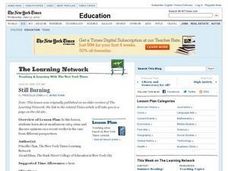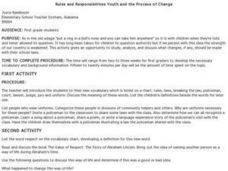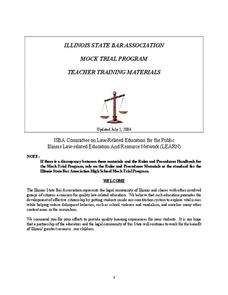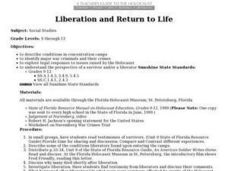Curated OER
Understanding the Significance of the Nationalization of the Bill of Rights
Eleventh graders study the impact of the Nationalization of the Bill of Rights upon criminal law. They analyze opposition to expansionist viewpoints that could possibly create more checks and balances on the state courts and analyze...
Curated OER
Ghosts of Rwanda: Reconciliation and Reparations
Students examine a specific case of genocide participation in Rwanda. Working in groups, they simulate the courtroom drama, from the positions of victim, perpetrator, and court monitor. They conclude by writing essays on the...
Curated OER
Still Burning
Young scholars study about an infamous 1964 crime and discuss opinions on a recent verdict in the case from different perspectives.
Curated OER
Rules and Responsibilities Youth and the Process of Change
First graders learn vocabulary in regards to laws, courts, and policeman. They read and discuss the book, The Value of Respect: The Story of Abraham Lincoln. An attorney visits the classroom and discusses the roles of judges and juries.
Curated OER
Civics: Missouri's Non-Partisan Court Plan
Students examine the ways that the Missouri Non-Partisan Court Plan helps the court maintain a system of separation of powers and checks and balances. After discussing the principle of judicial impartiality, they complete a chart...
Curated OER
Michigan Judicial System Conclusion
Pupils identify the courts that make up Michigan's judicial system. They state the responsibilities of each court and diagram a flow chart of how a case moves to the Michigan Supreme Court. They participate in a quiz about the current...
Curated OER
Parental Accountability and Public Policy
Pupils investigate parental responsibility for the actions of their Students. They compare the responsibility in the State of Washington and the rest of the country.
Carolina K-12
Are You a Democrat or a Republican? Are You Really?
Have new or soon-to-be voters examine different political parties and their platforms as they figure out which one aligns most with their beliefs. After taking a few online quizzes, students split into pairs to discuss and then...
Curated OER
Allen's Dilemma
Students read, discuss and act out an actual case study dealing with a juvenile crime. They complete discussion questions associated with case study.
Curated OER
12 Days of Christmas
Learners utilize different problem-solving strategies and creative writing when dealing with the words from the song, "12 Days of Christmas." They try to problem solve how may presents were given and then explain their sequence in the...
Deliberating in a Democracy
Domestic Violence
High schoolers examine domestic violence issues. In this global studies instructional activity, students read a case study on domestic violence. High schoolers take notes on the case and respond to discussion questions.
Curated OER
Synonyms and Antonyms
Mix up your writing lessons by having kids look at recent newspaper articles instead of their own work. They work in pairs and rewrite sports news articles using synonyms and antonyms for a set number of words. Then they share their work...
Curated OER
Racial Profiling
High schoolers debate both positions on the controversial topic of racial profiling with support for each and then develop a consensus position on how racial profiling as a law enforcement tool should be used.
Curated OER
Paying for Crime
Students participate in activties examining ratios and proportions. They use graphs to interpret data showing the government's budget for prisons. They present what they have learned to the class.
Curated OER
Apple Estimation: Percentages & Subjective Reasoning
Students practice using their estimation skills by utilizing apples. In this percentage lesson, students utilize a scale and an apple to discover the percentage of each bite they take. Students share their data with the rest...
Curated OER
Studying the Food Pyramid
Students explore the food pyramid and how to eat a healthy diet. In this nutrition lesson, students use pictures to make charts of food from the different food groups, record the food they eat throughout the day, investigate the...
Curated OER
What Makes a Good Law?
Why were laws created? Spark a group discussion on why we need laws to co-exist. Should the sale of some things be outlawed on Sundays? Read a case summary between Target and the state of Minnesota that debated this issue. Ask your...
Illinois State Bar Association
Mock Trial Teacher Training
Whether you are new to the mock trial format or have extensive experience with the program, you'll find much to learn from this teacher training manual that includes strategies for teaching the various aspects of court room trials.
Curated OER
Tech: Medical Forensics
High schoolers explore what it takes to be a forensic scientist or pathologist. They view a PowerPoint, discuss what education and skills are needed to succeed as a pathologist. They play a game to test their observation skills, a skill...
Curated OER
Lesson: The U.S. Westward Movement
Students research the U.S. Westward movement. In this U.S. history lesson, students research the topic, complete a creative writing activity for the lesson, and a design activity for the lesson.
Curated OER
Liberation and Return to Life
Students read testimonies of Holocaust survivors, describe conditions liberators found upon entering camps, investigate liberation, and research background of the Office of Special Investigations and Nuremberg War Crimes Trials.






















